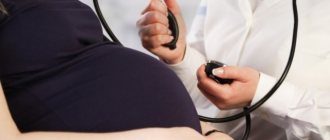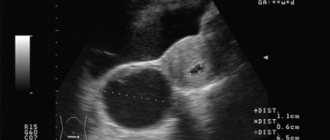Types of pathology
What should an expectant mother do if she has nausea and vomiting containing bile?
Undoubtedly, you need to seek help from a doctor who has been observing her since the beginning of pregnancy. The doctor will conduct a survey and, if necessary, prescribe additional tests. This is primarily done in order to find out the true cause of vomiting, on which further tactics will depend. If upon examination it turns out that this symptom arose under the influence of inflammation or infection, then it would be correct to begin treatment by eliminating the underlying cause. For example, if appendicitis is detected, urgent surgery is necessary, and infectious diseases require conservative therapy with the use of appropriate medications.
In situations where acute pathology and emergency conditions are not detected, supportive and symptomatic treatment is used, which can alleviate the discomfort of the pregnant woman and reduce the symptoms of vomiting. When the liver and gallbladder function are impaired, treatment with hepatoprotectors is often used. These drugs contain digestive enzymes, help partially relieve the liver, improve food digestion and eliminate symptoms of dyspepsia.
Regardless of the cause, vomiting should not be ignored, as it is fraught with serious consequences. Possible complications of repeated vomiting:
- dehydration of the body;
- miscarriage or premature birth caused by intense abdominal contractions.
In rare cases, the gag reflex is a symptom of a serious illness and requires specialist consultation.
To make an accurate diagnosis, you need to know which vomiting during pregnancy indicates pathological changes in the body:
- Morning sickness is not uncommon for many women who are expecting a baby, but vomiting during pregnancy in the evening is typical for diseases of the gastrointestinal tract.
- Vomiting during pregnancy, accompanied by fever. This occurs in acute intestinal infections and pathologies of internal organs, as well as in diseases of the genitourinary system.
- Diarrhea and vomiting during pregnancy occur due to food poisoning or infectious intestinal diseases.
- Vomiting of bile during pregnancy usually occurs in the morning, on an empty stomach. If this condition worsens after eating, this may indicate inflammation in the gallbladder (cholecystitis) or pancreas (pancreatitis).
- Vomiting blood during pregnancy indicates the manifestation or exacerbation of a gastric ulcer, as well as varicose veins of the esophagus. Also, with repeated vomiting, there is a risk of microcracks in the mucous membranes of these organs, which also contributes to the appearance of blood in the vomit.
- Acid vomiting during pregnancy occurs due to increased acidity in the stomach. A pregnant woman should carefully monitor the functioning of the gastrointestinal tract and control the acid that is released from the body.
- Green vomit during pregnancy often occurs as a result of repeated vomiting, the amount of bile rapidly increases, and the color of the vomit takes on a green tint. This color can also be caused by infectious diseases and mushroom poisoning.
Causes of vomiting in pregnant women
Vomiting in late pregnancy is a dangerous symptom
Throughout pregnancy, toxicosis can occur in any woman and is considered a completely natural phenomenon.
Despite this, such a condition in the initial stages of gestation is 100% normal, but in later stages it is normal with a certain pathological context.
Of course, “late” toxicosis itself is not dangerous, but the nature of its manifestation is a little dangerous. The risks of pregnancy complications in women are especially high:
- over 35 years of age;
- previously suffered miscarriages and abortions;
- having pathologies of the heart and blood vessels, liver or endocrine system.
Late toxicosis manifests itself as:
- nausea;
- dizziness;
- tinnitus and headaches;
- weight gain;
- high blood pressure;
- development of edema of the extremities.
To the surprise of many, vomiting in late pregnancy is not a phenomenon of toxicosis. It develops for a different reason.
If at the early stage of fetal growth vomiting was the body’s reaction to increased secretion of hormones and the lack of the need to absorb certain substances from food, then in the later stages of pregnancy, emptying of the gastrointestinal tract in women occurs due to the large size of the child.
By this moment, the fetus has grown significantly and begins to put pressure on the internal organs of the expectant mother. For this reason, the body refuses to take food, especially with a large intake, and “throws it out” in the form of vomiting.
Of course, hormonal problems also have some influence on this phenomenon, but they cannot definitely be considered the main reason for its development. Unlike the same nausea.
Consequences
Vomiting, in addition to discomfort, causes a lot of other unpleasant consequences for any person. For a pregnant woman, it is dangerous because the fetus itself can suffer. Dehydration is the first and obligatory consequence of the body’s vomiting reaction. Severe vomiting, which prevents food from remaining in the body, sometimes triggers the process of tissue destruction from the inside due to lack of nutrients.
When vomiting bile during pregnancy, the acids irritate the stomach, which leads to inflammation, and subsequently the development of serious diseases. It is worth stopping the vomiting as soon as possible with the help of a doctor or on your own.
Etiology
Diarrhea and vomiting during pregnancy can be a clinical manifestation of both a specific illness and external negative factors. The latter include:
- poor nutrition – the diet lacks vitamins and minerals, fatty, spicy foods predominate;
- frequent stress, nervous tension;
- non-compliance with the daily routine;
- not drinking enough fluid per day.
It should also be noted that vomiting during early pregnancy is a natural physiological reaction of the body to changes. However, if vomiting attacks are quite frequent, there is a risk of developing dehydration, which is extremely dangerous for the health of the child and the mother herself.
Also, vomiting during pregnancy can be a clinical manifestation of the following disorders in the body:
- food poisoning;
- intestinal infection (salmonella, norovirus, rotavirus);
- pancreatitis.
In addition to diseases of a gastroenterological nature, such a symptom may be the body’s reaction to certain medications or herbal infusions, which is also due to physiological changes in the body of a pregnant woman.
It is also necessary to understand that the manifestation of this symptom can be considered as a natural physiological process only in the early stages of pregnancy, no later than the second trimester. In the later stages, especially at 36 weeks of pregnancy, severe vomiting clearly indicates a certain pathological process in the body, including directly related to the development of the fetus.
When does vomiting during pregnancy become dangerous?
During pregnancy, vomiting in women is normal and goes away on its own after the body has completely adjusted to its new state. But there are cases when, in combination with other symptoms, vomiting during pregnancy is pathological and requires emergency medical attention.
You should consult a doctor if:
- During pregnancy, a woman experiences nausea without vomiting in combination with increased blood pressure;
- there is repeated vomiting in the second trimester of pregnancy;
- gagging is accompanied by an increase in body temperature or disruption of the digestive system;
- there is blood in the vomit;
- vomiting during pregnancy is yellow or has a green tint;
- significant weight loss occurs;
- there are signs of intoxication and dehydration;
- there is swelling.
When should you start worrying?
According to statistics, only up to 15% of pregnant women require treatment for symptoms and manifestations of nausea. They exhibit a medium and severe stage of vomiting, which manifests itself in the fact that the woman carrying the baby rapidly loses all the substances and resources accumulated in the body. A young mother may experience a stage of intoxication and dehydration , which negatively affects her health and the unborn child.
Reading...
Why does a pregnant woman experience discomfort in the form of heaviness in the abdomen?
You need to make an appointment with a doctor if:
- Vomiting occurs a large number of times per day, more than six;
- There is rapid weight loss;
- The amount and color of urine decreases;
- Dry mouth appears;
- Movements are inhibited and mental activity decreases;
- Heart rate increases;
- Fainting occurs or a pre-fainting state occurs during daylight hours.
In this case, the attending doctor may recommend hospital stay. A woman’s condition during pregnancy can be alleviated by intravenously administered medications that can stop the process of intoxication of the body and compensate for the imbalance of the necessary fluid.
If the medications prescribed by the doctor do not give positive results and the pregnant woman’s condition worsens, the doctor may decide to interrupt the pregnancy process. But such measures are drastic and are taken extremely rarely.
Also, to alleviate the current situation, you can ask for vacation or sick leave at work so that the body can begin its recovery. Toxicosis in most cases tends to end after 12-14 weeks of pregnancy .
- Related Posts
- Why does a pregnant woman experience discomfort in the form of heaviness in the abdomen?
- What are the reasons for chest pain during pregnancy?
- How to treat pyelonephritis in a pregnant woman and how it can harm
Diagnostics
If symptoms occur, you should notify your obstetrician-gynecologist. You may need to consult other doctors to help establish a diagnosis and prescribe the correct treatment. A gastroenterologist will help identify gastrointestinal problems. An endocrinologist, infectious disease specialist, and oncologist will help identify pathology in other areas.
To make a diagnosis, the following tests may be necessary:
- UAC and OAM;
- Blood chemistry;
- Analysis for tumor markers;
- Ultrasound of the digestive organs;
- Fetal ultrasound;
- MRI.
As a result of the measures taken, the attending physician makes a diagnosis and prescribes the optimal treatment for a pregnant woman.
Food poisoning
The cause of food poisoning is most often the consumption of stale or poor-quality food. A surge in incidence is observed in late spring and summer, when pathogenic bacteria multiply especially actively. During this same period, the likelihood of poisoning by wild mushrooms and various poisonous plants increases.
- severe nausea;
- repeated vomiting;
- abdominal pain (in the epigastric region, around the navel);
- bloating;
- flatulence;
- diarrhea;
- increase in body temperature.
Signs of food poisoning develop 1-4 hours after eating low-quality foods. In rare cases, the incubation period lasts about a day. The simultaneous development of the disease in a group of people who ate the same dish is very typical.
An increase in body temperature with food poisoning does not always occur. With a mild course of the disease, body temperature remains normal or rises very slightly. In severe situations, the temperature may rise to 39 °C or higher.
The consequences of food poisoning can be very sad. First of all, the expectant mother faces dehydration due to severe vomiting and diarrhea. Typical signs of dehydration include:
- dry skin and mucous membranes;
- pale skin;
- dyspnea;
- increased heart rate;
- decreased blood pressure;
- decreased diuresis (frequency and volume of urination);
- convulsions.
Pathogenic microorganisms that enter the intestines of the expectant mother can penetrate the placenta to the fetus. The most dangerous in this regard are poisonous mushrooms, which can cause severe disorders in a baby. In case of mushroom poisoning, treatment of a pregnant woman should be carried out only in a hospital.
First aid for food poisoning:
Before the doctor arrives, it is prohibited:
- Induce vomiting artificially.
- Take any medications other than those listed above.
- Eat any food.
In severe cases of the disease, food poisoning is treated in a hospital. In mild cases, you can get by with semi-bed rest at home. If poisoning leads to any pregnancy complications (hypertonicity of the uterus, rupture of water, changes in fetal motor activity, etc.), you should consult a gynecologist.
How to alleviate the condition?
What to do if you experience vomiting during pregnancy? Toxicosis causes severe discomfort for pregnant women. To help your body cope with the feeling of nausea, you can eat a green apple or take a few sips of mineral water in the morning, without getting out of bed.
Expectant mothers often wonder whether pregnant women can induce vomiting to relieve their condition in case of nausea. No, you shouldn’t do this; every effort should be made to minimize the occurrence of vomiting in pregnant women.
To make it easier, just follow simple rules:
- exclude fatty, smoked, sweet foods from the diet, and also avoid drinking carbonated drinks and coffee;
- change your daily routine, relax more and be in the fresh air;
- drink teas with the addition of mint, lemon balm, ginger;
- eat food in fractional portions and avoid overeating.
Expectant mothers should be attentive to their health, because a woman’s body during this period is very vulnerable and sensitive to external irritants. It is necessary to notify the attending physician about all changes and symptoms in a timely manner to avoid negative consequences.
How to eliminate manifestations of toxicosis
Vomiting may occur throughout the day
Treatment of normal toxicosis during pregnancy, which does not have serious manifestations, is not required. Pregnant women can improve their condition in every possible way, but specialized drug therapy is not available to them.
Treatment of early or late toxicosis is carried out only under two conditions:
- Its increased occurrence is caused by food poisoning (in particular, excessive vomiting and severe nausea are observed).
- The toxic state itself is very severe and has the risk of complicating pregnancy.
Read: Colorless feces: causes, diagnosis, treatment
Toxicosis can only be treated with the permission of a professional doctor and exclusively under his direct supervision. To organize therapy, pregnant women should contact their supervising specialist. After a comprehensive diagnosis of a woman and determination of the real danger of toxicosis, the following are possible:
- Recommendations for changing diet and lifestyle in general.
- Prescribing certain medications.
- A room with a hospital for treatment under the supervision of doctors.
- Each case is individual, so we will not consider the principles of treatment of pathological toxicosis in more detail.
As for its normal course, such toxicosis is enough to endure. Of course, it’s hard to endure, but for the sake of the child, you still need to do it. You can alleviate the condition and reduce the manifestations of vomiting and nausea by:
- Organization of proper and fractional nutrition.
- Avoid eating too hot foods; preference should be given to warm or even cold dishes.
- Complete absence of overeating.
- Frequent walks in the fresh air.
- Periodically eating mashed ginger, for example, with tea.
Taking properly selected mineral and vitamin complexes can also help you survive toxicosis. Naturally, you can start taking such medications only with the permission and specialized prescription of a doctor. Otherwise, there are considerable risks of only harming the condition and increasing the manifestations of toxicosis.
Perhaps, this is where the most important provisions on the topic of today’s article have come to an end. As you can see, vomiting in late pregnancy and the general manifestation of toxicosis are quite normal.
It requires attention, but if it occurs normally, specialized therapy is not needed. We hope that the presented material was useful to all readers of our resource and provided answers to their questions.
Want to know how to overcome nausea during pregnancy? Watch the video consultation:
https://www.youtube.com/watch?v=ZrD6WaejDfk
Read along with this article:
- Diarrhea and pregnancy, causes of diarrhea
- Diarrhea during pregnancy, is it dangerous?
- Vomiting and diarrhea during pregnancy: when should you sound the alarm?
- Nausea after every meal: possible causes, treatment and...
- Diarrhea during pregnancy: what to do, causes of diarrhea
- The main causes of nausea in the morning: listening to the alarm...
- Can pregnant women eat liver - all the pros and cons
- Can pregnant women eat grapefruit: pros and cons
- Treatment of constipation during pregnancy, features of the problem
Treatment
Moderate and severe stages of symptom severity require hospitalization. Medications, especially in the first trimester of pregnancy, can harm the fetus. The use of medications is kept to a minimum. When vomiting, the doctor recommends taking sorbents, enzymes, and antiemetic drugs to alleviate the patient’s condition. Diet adherence will be required.
You can calm your stomach when you feel sick at home by taking tea with ginger, still mineral water, or a decoction of mint or rosehip.
Intestinal infection in pregnant women poses a danger to the unborn child and requires immediate treatment. For a mild form of the disease, removal of toxins using absorbent drugs will be required. Severe cases require hospital treatment. To remove toxins, the patient is given IV drips. After the examination and receipt of test results, the doctor prescribes medications.
Pancreatitis is difficult to diagnose and treat. Therapy for the disease during pregnancy does not differ from the treatment of other patients; it is aimed at relieving intoxication, eliminating pain, and eliminating inflammation. The acute form requires surgical intervention. The question of termination of pregnancy arises.
Classification
There are several degrees of severity of vomiting during pregnancy:
- weak - attacks of vomiting are observed no more than 5 times a day, the woman generally feels well, no additional symptoms other than nausea are observed;
- medium – vomiting up to 10 times a day, general deterioration of health, symptoms of the initial stage of dehydration;
- severe – attacks of severe vomiting more than 10 times a day, diarrhea, dehydration.
Severity of vomiting during pregnancy
With symptoms at the middle stage of development of such a symptom, hospitalization of the woman is required, since this is a deviation from the normal course of pregnancy.
Some women are not bothered by toxicosis at all. In other pregnant women, it can manifest itself with varying intensity:
- 1st degree. Vomiting occurs no more than 5 times a day and can lead to minor weight loss.
- 2nd degree. This form is more severe. The expectant mother vomits up to 10 times a day. As a result, the woman loses weight - about 3 kg per week. In addition, the pregnant woman develops tachycardia, hypotension, and possible fainting. With this form of toxicosis, a woman needs medical supervision.
- 3rd degree. Vomiting up to 25 times a day, which leads to loss of large amounts of fluid and rapid weight loss. In this condition, the expectant mother needs urgent medical attention.








